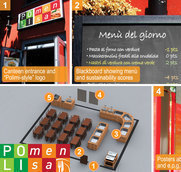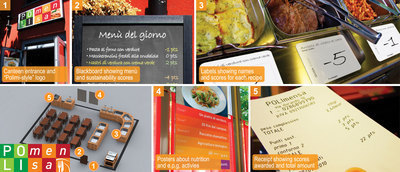
The POLImensa Product-Service-System (PSS) concept was developed during a 2-week course on “System Design for Sustainability Course” at the Politecnico di Milano, and was one of the winners of the LeNS (Learning Network on Sustainability) Competition in 2010. The competition invited students “to design a sustainable product-service system (SPSS) that addresses key environmental and social problem(s) in the sectors of Food, Health/Well-being, and Mobility”.
POLImensa – A PSS for a sustainable campus canteen
POLImensa is a concept for a Product-Service-System (PSS), a combination of products, services and communication media that work in synergy to deliver value to people while greatly reducing their impact on environment and society. In this case, POLImensa combines a number of products and service dynamics to create a campus canteen which embraces sustainability on a systemic level: from energy source to cooking equipment, from supply chain to food preparation and even consumption habits.
Everything starts from the University, namely the Politecnico di Milano, where the concept was developed.
The Politecnico starts by making a lease deal with the appliance producers: the manufacturer provides a lease for his devices, including all maintenance as well as electricity consumed by the canteen; the University, in turn, pays a monthly fee to the manufacturer, and agrees to install solar panels to power up the canteen. This creates a win-win situation:
This eco-efficiency system provides the canteen with sustainable energy, while creating an economic interest for the manufacturer in developing more durable products.
Another major part of the system is of course the food offer, which combines elements of both environmental and social sustainability.
The recipes are based only on seasonal ingredients and are proposed every week by a number of elderly people from the local community who share their expertise with the canteen cooks.
Each week students can vote online for their favorite recipes, and the most popular ones will be featured in the menu. Once the menu is established, the ingredients are collected by a student-based “Ethical Purchase Group”, which selects and personally contacts a number of local organic farmers to get the supplies.
Inside the canteen, durable steel trays and cutlery are used to carry and eat the food. The pricing system is based on two portion sizes which are aimed at reducing the amount of leftovers. Plus, each recipe is also labelled with a “sustainability score”: higher scores are rewarded with bonuses, thus encouraging more sustainable diets (e.g. lower in meat and higher in vegetables).
Last but not least. Canteen leftovers or excess supplies are either composted or offered to charity associations according to the case.

Comments by our Users
Be the first to write a comment for this item.